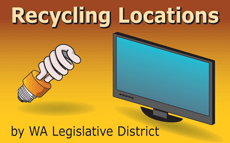Your lifestyle is making recycling unsustainable
A March 27, 2018 CBC News article ties together changing lifestyles, the evolving ton, curbside [blue box] recycling, China policies, and producer responsibility that applies equally to the U.S. and Canada:
"It's really a perfect storm of crazy stuff going on that means that the blue box has huge challenges that it did not have 10 years ago," says Maria Kelleher, principal of Toronto-based Kelleher Environmental... The problem is that we're now throwing out a huge variety of new types of packaging — mostly plastics, sometimes glued to other materials like metals — that recycling programs were never meant to deal with. Meanwhile, the materials that they were designed to collect, sort and resell make up a shrinking proportion of what comes in...
One solution is what's known as extended producer responsibility, where the manufacturers that produce the packaging are also responsible for recycling it. Producers share the cost of recycling with municipalities in Ontario, Saskatchewan, Manitoba, P.E.I. and Quebec.
In B.C., the first province where producers are fully responsible for recycling costs, they're also responsible for every other aspect of recycling, from collection to processing to finding markets for the recycled materials, through an organization called Recycle BC.
Allen Langdon, Recycle BC's managing director, says managing the entire province's recycling on a system-wide basis — instead of via individual municipalities — and working directly with packaging producers is the only practical way to deal with the speed at which packaging and the markets for recyclables are changing.
"The current system of managing recycling is not working," Langdon says, "and anyone that thinks it's going to continue to work that way is not keeping up with where the trends are going."
Recycle BC's Langdon will be the keynote speaker at the May 2018 Washington State Recycling Association conference.
